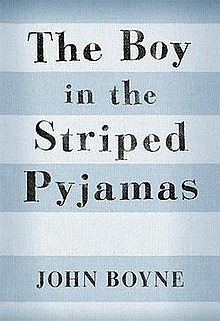
This novel is the holocaust as seen through the eyes of a child. It’s as harrowing as I’m sure you are imagining it to be. Thankfully, it’s entirely fictional, but it does a good job of highlighting the very real and unnecessary evils which were committed in Nazi Germany.
The main character, Bruno, is a young boy whose father is a high ranking Nazi who gets promoted to a position in Auschwitz, causing the whole family move to a new home not far from the death camp. Bruno is completely ignorant about what’s happening to Jewish people in his country and he ends up making a friend named Shmuel, who lives in the camp on the opposite side of the fence to him.
One of the most disturbing things about this book, is the way that it’s very easy to get caught up in Bruno’s perspective. He’s just a regular kid. All his worries in life boil down to him not getting on with his sister, him missing his old friends and him feeling bored with nothing to do in his new home. Sometimes you’ll feel like you’re really a light-hearted novel about a child, only for a horrible reminder of the broader setting to suddenly rear its ugly head.
This isn’t always done well, however. Bruno is unable to pronounce ‘Auschwitz’ so he always calls it ‘Out With’. Similarly, he can’t pronounce ‘Führer’ so he ends up saying ‘Fury’. I don’t quite know exactly why this was done. It could have been to disguise the true setting in order for the reader to slowly realise as they go along, but in my opinion it’s pretty obvious from the start. Having said that, full disclaimer, I did already know because I saw the film several years ago, but I feel like I would have figured it out based on all the clues.
Some people have also taken issue with some of its historical inaccuracies. For example, things would not have been so lax as to allow for Shmuel to sit at the fence and make friends with someone outside. Let alone, to climb under it and have fun outside of the camp every now and then. Boyne argues that this was artistic licence used to show the horrors of the holocaust (which this novel certainly does not shy away from), while others have said that by not using the real words and by adding in these inaccuracies, it’s unhelpful to children who may be reading and learning about the holocaust for the first time and might acquire misconceptions.
I think these are fair and valid criticisms, though I also don’t think that they took anything away from my own personal reading. The friendship the grows between Bruno and Shmuel is beautiful and touching and it’s downright heart-breaking to see the cold hard realities of Nazi Germany come crashing down around them. Bruno was occasionally irritating (because of his ignorance), but Shmuel is nothing but a pure soul throughout and you’ll find yourself wishing you could save him from the horrific historic context.
So I’m happy to recommend this to people, so long as they keep in mind that it may not be the most accurate piece of holocaust literature. You also need to brace yourself because it is very bleak and I think some people may find it too upsetting… but then, on the other hand, it’s important to be upset in the process of remembering atrocities which must never be forgotten.
Rating: 8/10
